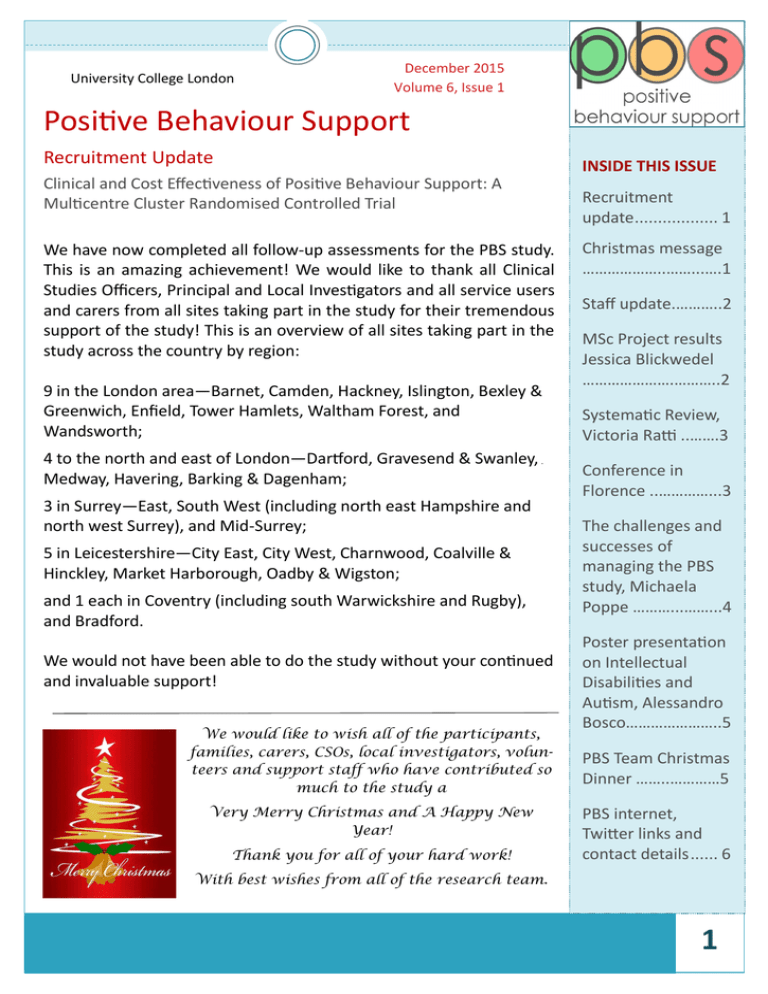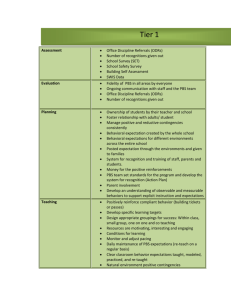Positive Behaviour Support Recruitment Update
advertisement

University College London December 2015 Volume 6, Issue 1 Positive Behaviour Support Recruitment Update INSIDE THIS ISSUE Clinical and Cost Effectiveness of Positive Behaviour Support: A Multicentre Cluster Randomised Controlled Trial We have now completed all follow-up assessments for the PBS study. This is an amazing achievement! We would like to thank all Clinical Studies Officers, Principal and Local Investigators and all service users and carers from all sites taking part in the study for their tremendous support of the study! This is an overview of all sites taking part in the study across the country by region: 9 in the London area—Barnet, Camden, Hackney, Islington, Bexley & Greenwich, Enfield, Tower Hamlets, Waltham Forest, and Wandsworth; 4 to the north and east of London—Dartford, Gravesend & Swanley, Medway, Havering, Barking & Dagenham; 3 in Surrey—East, South West (including north east Hampshire and north west Surrey), and Mid-Surrey; 5 in Leicestershire—City East, City West, Charnwood, Coalville & Hinckley, Market Harborough, Oadby & Wigston; and 1 each in Coventry (including south Warwickshire and Rugby), and Bradford. We would not have been able to do the study without your continued and invaluable support! We would like to wish all of the participants, families, carers, CSOs, local investigators, volunteers and support staff who have contributed so much to the study a Very Merry Christmas and A Happy New Year! Thank you for all of your hard work! Recruitment update .................. 1 Christmas message ………………..……...….1 Staff update.………..2 MSc Project results Jessica Blickwedel ………………….………..2 Systematic Review, Victoria Ratti ..…….3 Conference in Florence ..…………...3 The challenges and successes of managing the PBS study, Michaela Poppe ………...……...4 Poster presentation on Intellectual Disabilities and Autism, Alessandro Bosco…………………..5 PBS Team Christmas Dinner ……..…………5 PBS internet, Twitter links and contact details ...... 6 With best wishes from all of the research team. 1 Staff update Chris Anderson has left the study team at the end of November to move up North. We would like to thank him for all his support and we wish him all the best for the future! Here’s a photo from his leaving do. Congratulations to Alessandro Bosco for joining the PBS study Team at UCL as an As & When Research Assistant in November! Alessandro has already been part of the team as a Research Intern and will continue with the qualitative interviews with service users, carers, staff and service managers to discuss their views of the PBS training and intervention. Our Research Assistant Jessica Blickwedel started medical school at the University of Warwick in September. While attending a large number of lectures and seminars and juggling her coursework, she is also still working on the PBS study part-time. MSc Project results Jessica Blickwedel As part of my MSc in Psychiatric Research here at UCL, I investigated epilepsy in people with challenging behaviour and intellectual disability. I wanted to explore the severity of overall challenging behaviour and challenging behaviour subtypes, mental health as well as carer wellbeing and strain. In addition I considered epilepsy factors, such as seizure type, frequency and drug burden as potential explanatory variables for the outcomes within the epilepsy group. For my study, I used some of the data collected from the PBS study at baseline and contacted those participants who have epilepsy for a short additional interview about the person’s epilepsy. Data for 238 participants was included, 69 of whom had epilepsy. I found that participants with epilepsy were found to have significantly lower adaptive behaviour (p=0.01) and scored significantly lower for one challenging behaviour subgroup, i.e. the lethargy subscale (p=0.044) of the ABC (a measure of challenging behaviour) than those without epilepsy. No other associations between epilepsy or specific epilepsy factors and challenging behaviour, challenging behaviour subgroups, mental health or carer wellbeing and strain were found. Therefore I concluded that epilepsy does not serve as a good predictor for severity of challenging behaviour, or severity of challenging behaviour subtypes, mental health problems and carer wellbeing or strain in people with intellectual disability and challenging behaviour. This is consistent with the majority of previous findings, i.e. no link between a diagnosis of epilepsy and having challenging behaviour, within the general intellectual disability population. 2 The effectiveness of person-centred planning for people with intellectual disabilities: a systematic review Person-Centred Planning (PCP) is considered as a must in the provision of care for people with intellectual disabilities (ID). I wanted to evaluate whether there is enough evidence to support the use of PCP and to identify what outcomes PCP is most likely to have a positive impact on. In order to evaluate the effectiveness of PCP, I and a team of collaborators (A.Hassiotis, J.Crabtree, P. Gallagher, S.Deb and G. Unwin) conducted a systematic review of the literature investigating the impact of PCP on quality of life outcomes (e.g. community involvement, participation in activities choice, behaviour etc.) for people with ID. We searched electronic databases for studies evaluating the impact of PCP on people with ID, published between 1990 and 2014. We also manually reviewed the references lists of identified papers to see if we could find further relevant studies. All studies were considered as long as outcomes reflected the impact of PCP on individuals with ID. Sixteen relevant studies were found and included in the review. The overall quality of the evidence was low but suggestive that PCP may have a positive, yet moderate, impact on outcomes for individuals with ID. Studies reported a range of outcomes with the most positive impact being on community-participation, participation in activities and daily choice-making. In other areas such as employment the findings were inconsistent. In conclusion we can say that there is an emerging evidence-base, supporting the effectiveness of PCP enhancing some aspects of the lives of people with ID. Nevertheless its clinical and cost effectiveness and wider implementation must be investigated in large scale research. Our paper has been submitted for publication. Victoria Ratti Conference in Florence The PBS Study team attended the 10th International Congress of the European Society on Mental Health in Intellectual Disability in Florence in September. Jessica Blickwedel presented findings from her MSc project on epilepsy in adults with intellectual disability and challenging behaviour, Victoria Ratti talked about her PhD which investigates whether there is a relationship between challenging behaviour and different care and support environments in people with intellectual disability and Michaela Poppe discussed the challenges and successes of managing the PBS study in a symposium chaired by Angela Hassiotis. 3 The challenges and successes of managing the PBS study I have been the trial manager for the PBS study for nearly 3 years. During this time, we have experienced a number of challenges at different stages of the PBS study. These included procedures that were crucial to the conduct of the trial and at times were time consuming and painstaking, but we managed to overcome any potential obstacles and challenges with the help of those involved in the study. Before we started recruiting participants for the study, we prepared documents in accessible format for service users. Ensuring that the documents were worded in an accessible way was crucial and it was important to select appropriate images for the respective content. We were grateful to receive support from an accessible information officer from one of the participating intellectual disability teams as well as feedback from the service user group from the Camden Advocacy Project who are involved in the study. During the recruitment phase, it was important to assess whether service users were able to consent for themselves. Where service users were not able to consent for themselves, we liaised with consultees regarding consent. One of the biggest challenges we have experienced and still are experiencing is to ensure that our Research Assistants Victoria and Jessica as well as all of the Clinical Studies Officers who have provided extremely valuable support for the study are not unblinded. This is important in order to avoid any potential risk of bias during the assessments. Furthermore, we have observed some staff turnover in paid carers, so in some cases follow-up assessments were done with different carers. This meant that there was a risk of some inconsistencies regarding information provided by different carers at different time points. We also found that the delivery of PBS has been challenging. PBS is a resource intensive intervention that requires time to deliver, which may be difficult if services are stretched to their limits due to budget cuts and staff shortages. Despite some of the challenges we have experienced, the study has been very successful. We have completed recruitment ahead of time and have a very low drop-out rate of just below 4%. A lot of credit for the success of the study has to be given to the Clinical Studies Officers without whose support we would never have been able to achieve this! A good working relationship with principal and local investigators at sites and staff trained in PBS has also played a very important role in the success of the study. Moreover, working together with the central study team at UCL (including statisticians and the health economist) as well as advice from the clinical trials unit involved in the study (PRIMENT), the service user group and the accessible information officer at one of the participating intellectual disability teams also proved to be invaluable. Last but not least, we would not have been able to do this work without the service users as well as family and paid carers who kindly gave their time to contribute to this important study! Michaela Poppe 4 Poster presentation on Intellectual Disabilities and Autism I am a Research Assistant on the PBS study conducting qualitative interviews for the trial and I am also investigating the mental health and challenging behaviours of individuals with Intellectual Disabilities and Autism Spectrum Disorder (ASD). In September, The Society for the Study of Behavioural Phenotypes (SSBP) held a symposium and educational day at UCL on the theme 'Behavioural phenotypes from the bench to bedside: translation of basic science to clinical practice' and I had the opportunity to present a poster on ‘Challenging behaviours in Adults with Intellectual Disabilities and Autism: baseline data from a cluster randomised control trial of Positive Behaviour Support’. Our poster presentation aimed to report on the levels of Challenging Behaviours and mental health of participants with comorbid autism. Autism Spectrum Disorder is a developmental disorder that affects social interaction, communication, interests and behaviour. Current prevalence estimates report that Autism affects 1 out of 68 individuals and studies suggest a high comorbidity of Autism with intellectual Disabilities. It is estimated that 70% of service users with Autism also have Intellectual Disabilities and similarly, individuals with more severe Intellectual Disabilities are at higher risk of Autism. The picture may be even more complicated by Challenging Behaviours, which affects the lives of service users and their carers. In many instances Challenging Behaviours may be linked to the frustration of not being able to express what the person wants to communicate. In our sample of 246 participants with ID we found 21% also screening positive for autism. The results from our investigation, reported on the poster, suggest an increased risk of Challenging Behaviours, Anxiety and Obsessive Compulsive Disorders in individuals with Intellectual Disabilities and comorbid Autism compared to those without Autism traits. The Poster received positive feedback by colleagues in the field of neurodevelopmental disorders and at this time we are continuing with the analyses of our results. Alessandro Bosco PBS Team Christmas Dinner The PBS team at UCL had a joint Christmas Dinner with the LonDowns study team on 3rd December. We celebrated our milestone of completing all follow-up assessments for the PBS study and the LonDowns team recruiting their 400th participant. Well done everyone! 5 The PBS website: www.ucl.ac.uk/positive-behaviour-support Twitter account: www.twitter.com/PBSstudy University College London Division of Psychiatry 6th Floor Maple House 149 Tottenham Court Road London W1T 7DN Phone: 020 7679 9311 a.hassiotis@ucl.ac.uk m.poppe@ucl.ac.uk v.ratti.11@ucl.ac.uk j.blickwedel@ucl.ac.uk alessandro.bosco@ucl.ac.uk The PBS study is funded by the National Institute for Health Research HTA Programme 6



